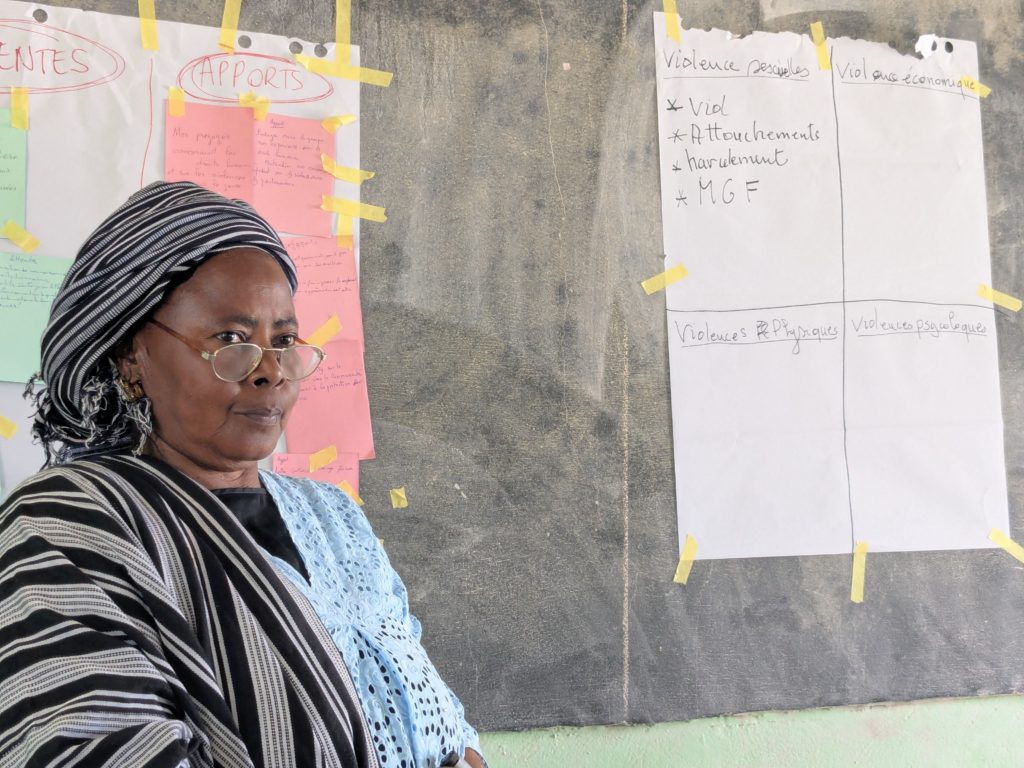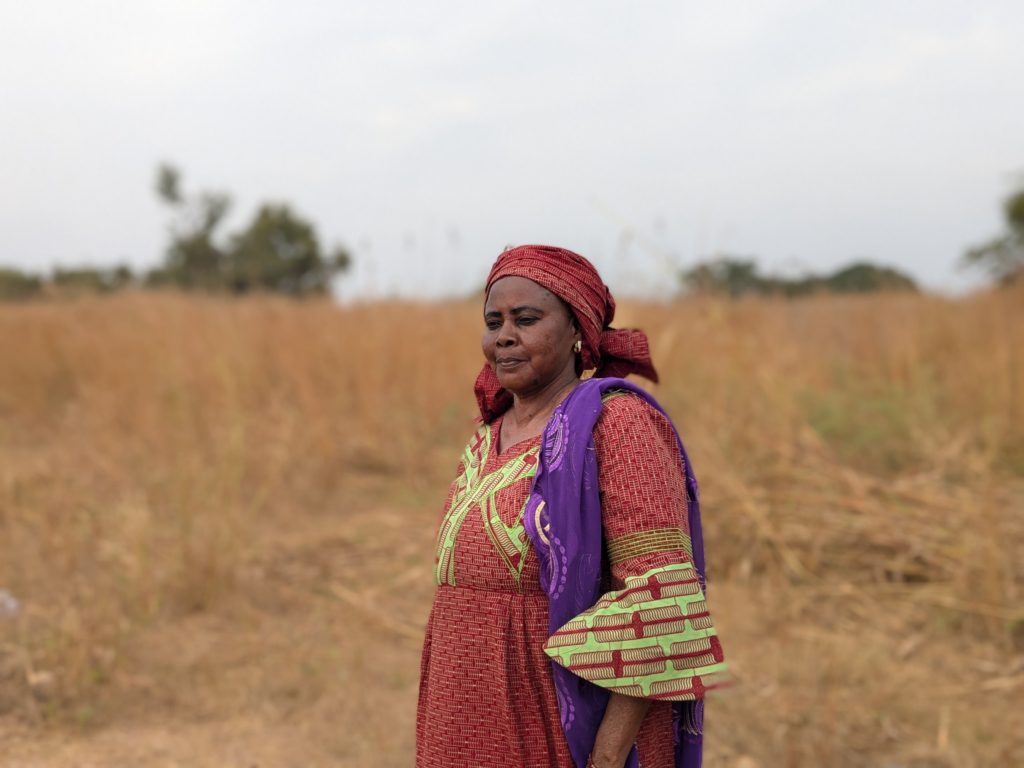Mariame Dabo, 59, lives in Tambakunda in eastern Senegal. As a survivor of female genital mutilation as a child, Maryam works tirelessly to raise community awareness of the rights of women and girls and to support victims of gender-based violence (GBV), particularly female genital mutilation (FGM).
Since 2009, she has provided voluntary support to Amnesty International’s programming as a member of the Committee to Combat Violence against Women. As the mother of a son, the administrative assistant said she wants to fight for women and girls whenever possible.
“I have seen something unacceptable and that is why I am committed to fighting all forms of gender-based violence. We support victims and look after them from a health and legal perspective. We do not get paid for this and do not expect anything in return. As long as I am alive and well, I will fight violence against women.
Through events with Amnesty International and other partners, we successfully bring men, women and young people together. We organize lectures, training sessions and intergenerational dialogues on early marriage, gender-based violence and human rights. Now community members are discussing with each other questions they were afraid to ask before. We also often invite religious leaders to our events.
I’m optimistic, but I know it won’t be easy!
Maryam Dabo
We conduct regular home visits. We sit down with couples to discuss female genital mutilation or gender-based violence. Men are my friends. I talk to men and boys a lot. There must be no taboos. We also do radio shows. Community radio stations are close to the people and are the gateway to achieving our goals.
We set up observation and warning committees. In Kusanar, Tambakunda province, a member of one of the committees rescued eight girls who had been put together to await mutilation. We also organize repair camps for women suffering from fistulas [perforation between the vagina and the bladder and/or rectum causing urine and/or faeces to leak through the vagina] In partnership with the United Nations Population Fund UNFPA.



From victim to survivor
As a victim of female genital mutilation, I work with girls to support them and raise awareness among parents so they can stop the practice. Due to the pain of labor and the next six months, I only had one child. For the type of female genital mutilation that I experienced, which is infibulation, they take scissors and, as we say, they cut out your sex so that the baby can come out. Then I had a problem and it was very painful. I feel comfortable talking about it. I don’t have any inhibitions. I don’t want another woman or another girl to be the victim of this pain.
I’m hopeful because we feel like the resections have started to decrease since we started the campaign. Some cutters have given up because they are now aware of the 1999 law banning cutting. Because as I said on the radio, “If you do this and get caught, you will be sentenced to three to five years in prison.” But I think the best way is to raise awareness.
This is how you solve problems: reach out to people, talk to them and explain the consequences.
Maryam Dabo
Women do not associate excision with all its health consequences. Sometimes death occurs; a girl may bleed to death. When a girl reaches adulthood and becomes pregnant, she may develop [an obstetric] Fistula. It could kill her if left untreated. If we are afraid to talk about this, women will surely continue to cut girls without understanding the pain and harm it causes them. Now, many people understand this and stop the practice. My mother understands it herself. Her granddaughter has not been cut yet.
During our event we discovered a few cutters. During one of our talks, we asked the audience if knives were available locally. One woman stood up and said, “Yes, that’s what I do.” She and the entire community attended our events. She said she would stop and asked anyone not to bring children to her home to be mutilated. This is how you solve problems: reach out to people, talk to them and explain the consequences.
These are cultural practices. The cutter’s grandmother and mother were cutters themselves. Knives are passed down and are a tradition in our region. In some peoples, if you don’t get cut, they say you are impure. Many people now understand that this is not the case and have abandoned the practice. Generally speaking, the people who cut daughters’ hair are grandmothers, mothers and aunts, and they do it behind the father’s back. That’s why we involve heads of households in our activities.
Our phone is like a toll-free number – people can call us
at any time!Maryam Dabo
I’m optimistic, but I know it won’t be easy! This is a long battle. We need volunteers and victims willing to talk about this. I think the state has an important role to play as well. As part of our ongoing program [with Amnesty]we signed a partnership agreement with the Ministry of Education. We need to work together so that every relevant department is committed to fighting cutting.
I have also dealt with men who beat their wives. I spoke to them calmly and asked them if they knew this was illegal. I can take them to the police or gendarmerie at the request of their wives because we do not make decisions for the victims. Due to my age and experience, I am no stranger to this community. As long as I get to someone’s house and say I want to talk to them, that’s fine. Some people are reluctant and hide, but we always catch them because we work with local leaders.
We mediate in the Court of Justice and if no solution is found, we accompany the victim to the Gendarmerie or the police station. Recently, around 11pm, I received a call about a case of a woman being beaten by her husband. I took photos and accompanied her to the hospital and then to the Justice Court, where her husband was summoned. Our phone is like a toll-free number – people can call us anytime!

I trust the judiciary. The last rape case I handled was a year ago. The man was tried and sentenced to 10 years in prison. There was another case two years ago in which a girl was raped and the rapist strangled her to death. We handled the case and the perpetrator was sentenced to life imprisonment. We will pursue the case to the end.
Pass the torch to young people
My message to young girls is to hang in there and work to raise awareness among your peers. We are an aging generation and soon we will no longer be able to conduct field missions, campaigns or anything to address these scourges.
We have grouped girls and boys into the Human Rights Education School Club. We are passing the torch to them. At their age, we don’t have the opportunity to be trained, but they have this opportunity and I think they will be able to lead the fight so that we can achieve zero GBV and zero FGM in our communities.
Amnesty International has implemented human rights education programs in Burkina Faso, Senegal and Sierra Leone since 2017, working to combat gender-based violence through education, awareness-raising and advocacy, with a view to changing mindsets and behaviors and helping to reform legislation in these countries.


